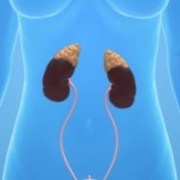 Hemera/Thinkstock
Hemera/Thinkstock
The adrenals are two glands above each kidney that produce a number of important hormones. The adrenals can be divided into the outer cortex, which produces hormones such as cortisol, aldosterone, testosterone, DHEA, DHEAS, androstenedione and estrogens, and the inner medulla, which produces epinephrine and norepinephrine (adrenaline).
Tumors of the adrenal medulla which produce excess epinephrine and norepinephrine are called pheochromocytomas, while deficiencies of the adrenal medulla do not give rise to clinical problems.
The hormones, cortisol and aldosterone, are two of the most important hormones the body makes and excesses and deficiencies of these hormones result in important clinical problems.
Cortisol, a glucocorticoid, is the stress hormone and is involved in weight control, fighting infections, quality of skin and bones and heart function. Its levels are the highest in the morning and it goes up with stress and severe illness.
Too much cortisol from any cause leads to Cushing’s syndrome; the symptoms and signs of which include weight gain, stretch marks, bruising, extra hair growth, irregular periods in women, loss of muscle, trouble sleeping and emotional problems, such as depression.
Too little cortisol is part of the syndrome called Addison’s disease, in which there is often low energy, joint and abdominal pain, weight loss, diarrhea, fever and electrolyte disturbances.
If the adrenal is making too little cortisol, the pituitary compensates and makes more of the hormone, ACTH. If the pituitary is not working, both ACTH an cortisol may be low.
Aldosterone is the salt-retaining hormone and is a mineralocorticoid. Excess of aldosterone leads to high blood pressure and low potassium.
Deficiencies of aldosterone are much less appreciated compared to deficiencies of cortisol and lead low blood pressure and high pulse, especially on standing, the desire to eat salt (salt-craving), dizziness or light-headedness on standing, and palpitations.
Severe cases may lead to high potassium and low sodium in blood tests. When the adrenal is not making aldosterone, the kidney hormone, renin, increases.
While it is well known that excesses of cortisol and aldosterone occur independently, it is important to realize that cortisol and aldosterone deficiencies may be independent, that is a patient may have only aldosterone deficiency, only cortisol deficiency or both deficiencies.
I recently found that many patients that have come to see me with the symptom of fatigue and often symptoms of salt-craving, “cognitive fuzziness”, dizziness or light-headedness on standing, or palpitations have low blood levels of aldosterone. The connection between low aldosterone levels and fatigue is as follows: With low aldosterone, the kidney loses salt, leading to low blood volume.
This coupled with the idea that the leg veins don’t constrict properly, leads to low blood volume going to the brain and the symptom of fatigue and other symptoms. These patients often have a drop in their blood pressure and an increase in their pulse when standing.
They may also have decreased blood flow to the brain when measured by SPECT scan. Aldosterone deficiency may be made worse if patients restrict their salt intake.
My soon-to-be published research has shown a few patterns of abnormalities in the renin-aldosterone axis. A little more than half of the patients with fatigue had low blood levels of both renin and aldosterone.
This is called hyporeninemic hypoaldosteronism and is probably due to dysfunction of what is called the autonomic nervous system, which sends messages from the brain to the kidneys.
Other aspects of the autonomic nervous system has been found to be deficient in chronic fatigue syndrome. About a third of the patients were found to have low aldosterone and high renin.
This indicates a deficiency in the aldosterone production in the adrenals themselves with a compensatory rise in the renin coming from the kidney. The aldosterone defect can either be isolated or part of Addison’s disease (often early Addison’s disease), in which both cortisol and aldosterone production are diminished.
The remaining patients had both high renin and high aldosterone. This is likely to be a compensatory rise in both of these hormones as a reaction to a low blood volume, most likely due to an inability of the kidney to retain salt.
I recommend treating patients with an individualized combination of increased salt consumption, a synthetic form of aldosterone called Florinef (fludrocortisone), or a drug used to raise blood pressure, called Midodrine (proamantine).
Salt is the most benign of the treatments and salt tablets can be purchased in a drug store or a patient can add an extra teaspoon of salt to their food per day.
Sea salt can be purchased at www.productosweb.com/30506-SEA-SALT-500-TABLETS.html/ or thermotabs (biosalt tabs) can be bought at http://www.immunesupport.com/thermotabs.htm/
Florinef comes in 0.1 mg pills and I usually start with 1/2 pill in the morning for a week or two and then go up to one pill in the morning if no side effects occur. The main side effects are headache and swelling in legs (edema).
Midodrine comes in 5 mg pills and I usually start with 5 mg pills in the morning and noon. I may go up to two pills three times a day and sometimes need to use both Florinef and Midodrine, as well as extra salt.
The side effects of Midodrine include high blood pressure, itching, goosebumps, numbness and the feeling of writing on your skin or scalp. Many of these side effects go away with use and both drugs are unlikely to cause long term damage.
Most patients taking Florinef and Midodrine, as well as extra salt, report an improvement in their symptoms of palpitations and dizziness/lightheadedness on standing, while many report an improvement in fatigue and cognitive dysfunction. Licorice, available as a tea from Alvita, may help with mild cases.
For more information about Dr. Friedman’s practice, go to www.goodhormonehealth.com/
Edited by Jody Smith





Add a CommentComments
There are no comments yet. Be the first one and get the conversation started!